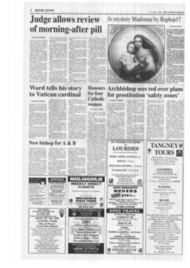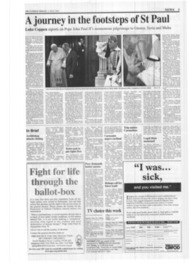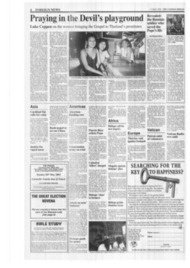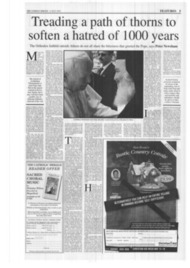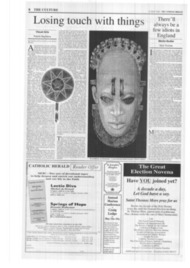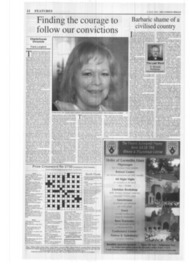Page 7, 11th May 2001
Page 7

Report an error
Noticed an error on this page?If you've noticed an error in this article please click here to report it.
Tags
Share
Related articles
Justice To The Memory Of Pius Xii
Anti-pius Travesty
Right Under His Nose
From Mr Karol Gajewski Sir, I Was Surprised To Read
Pius Xii: Hitler's Pope Or Saviour Of The Jews?
Pius XII was 'genuinely a "righteous gentile"
From Mr Karol Jozef Gajewski Sir, Although Anne Sebba's review of Susan Zuccotti's study: Under His Very Windows: The Vatican and the Holocaust in Italy (April 20) praises the "scholarship" of the American professor, some tendentious points remain to be answered.
Sebba states that Pius "offered not a gift but a loan" to the Jewish community in Rome when, in October 1943, SS commanders demanded 50 kilograms of gold within 36 hours or immediate deportation ofJews would begin.
Using this verbal sleight of hand, Pius appears in this account to be a man overly conscious of a good business deal even as the death squads were climbing into their lorries. Why a loan and not a gift? Yet, in the memoirs of Israel Zolli, chief Rabbi of Rome at the time, he makes it clear that the idea of a loan came from himself and not Pius.
Furthermore, in the same passage, Zolli wrote that "The Vatican had already spent millions in aiding fugitive Jews to reach safety."
Zuccotti is not averse to applying different standards of proof depending on whether witness statements show Pius Xll in a positive or negative light. For example, a Good Samaritan priest testified that Bishop Nicolini of Assisi held a letter in his hand, declaring that Pius had written asking for aid to be given to Italian Jews in 1943. But because the priest did not actually read the letter, his testimony is dismissed as unreliable. In Zuccotti's view, the devious bishop was most probably fooling the gullible priest.
Yet, when a German diplomat, Eitel Mollhausen, said (in a 1967 interview) that he sent specific information on the forthcoming roundup of Jews to Ernst von Weizsacker the German ambassador to the Holy See and assumed that it was passed on to the Pope, Zuccotti takes his testimony as a priori truth. The conclusion? Pope Pius knew in advance and was therefore morally culpable in not speaking out forcefully against the SS plan.
Sebba trots out the old and wearisome canard — hinted at by the Soviet official newspaper lzvestia in 1944, then given afflatus by Rolf Hochhuth's play Der Stellvertreter in 1963 — that Pius did not speak out against growing ant-Semitism before the war. Yet, as early as March 1928, the Holy Office had published an official declaration condemning anti-Semitism, largely at the instigation of the then nuncio in Germany, Eugenio Pacelli. The declaration condemned the promotion of xenophobic nationalism and the growing exaltation of the so-called Nordic race. This, of course, was some five years before the appointment of Hitler as Chancellor of Germany.
What is most disappointing, in Anne Sebba's review, however, is her apparent unwillingness to consider the context in which Susan Zuccotti's book has appeared.
Over the past two years, at least nine separate volumes have been published on the Vatican's role during the Second World War, ranging from the viciously antiPius polemic Hitler's Pope by John Cornwell to the carefully researched Hitler, the War and the Pope by Ronald J Rychlak of the University of Mississippi. This latter volume, which defends Pius, has recently been praised in an important article in The Weekly Standard by the American Jewish scholar David G. Dalin. Indeed, Dalin claims that Susan Zuccorti comes dangerously near to denying personal credibility to the very witnesses and survivors of the Holocaust itself and that — most importantly — Pius XII was "genuinely and profoundly a righteous gentile".
Yours faithfully, KAROL JOZEF 0 AJEWS K1 Sandbach, Cheshire.
blog comments powered by Disqus



